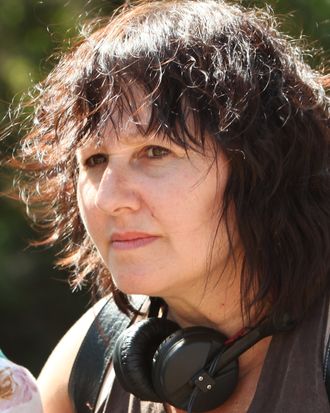
In 2012, 23-year-old physiotherapy student Jyoti Singh was gang-raped aboard a moving bus in Delhi. Walking home after seeing a movie, she and a male friend boarded the bus, not realizing it was out of service. Once they boarded, the six men on the bus knocked Singh’s friend unconscious, and then beat and raped Singh, damaging her internal organs with an iron rod. She died two weeks later. Of the six men involved in the attack, four have been sentenced to death by hanging; one allegedly committed suicide in his cell, and one, a juvenile at the time of the crime, was sentenced to three years in a detention center.
A new BBC documentary, India’s Daughter, explores the horrific crime and the protests that erupted in India in its aftermath — but was banned in India last month, before its scheduled broadcast on NDTV. The film features interviews with relatives of both the victim and the rapists — and, most controversially, an interview with one of the convicted rapists, Mukesh Singh, and his defense lawyers. In the promotional trailer that prompted the ban of the film, Singh states, “A decent girl won’t roam around after 9 o’clock at night.” He expresses similar attitudes throughout the film, asserting that “a girl is far more responsible for a rape than a boy,” and repeatedly refers to the crime as “an accident.”
Indian officials have cited various reasons for the ban. A news release from the Delhi police condemned Singh’s remarks, claiming that the excerpts of the film were “highly offensive and have already created a situation of tension and fear amongst women in our society.” The Ministry of Information and Broadcasting argued that the film would incite violence against women, while the minister of parliamentary affairs called it “an international conspiracy to defame India.” Some feminists in India have attacked the film for providing a dangerous platform for the views of the rapists, and others criticize the film — which was directed and produced by a British filmmaker, Leslee Udwin — for portraying “India as a place of ignorance and brutality toward women.”
Others have praised the film, hailing it as a necessary look at the situation not just in India, but around the globe: The New York premiere was attended by Meryl Streep, Dakota Fanning, and Freida Pinto, who asserted, “This is a film that needs to go out.” The documentary was broadcast in the U.K. on March 4, and is scheduled to air on PBS’s Independent Lens this fall. The Cut spoke with Udwin about her takeaways from speaking with the convicted rapists, her reaction to the ban in India, and response to the film’s critics.
What prompted you to make this film?
It was really the protesters. When I heard about the rape, obviously my stomach turned at the gruesome, vile details of intestines being pulled out, and God knows what. But I’d heard about horrific rapes before, not just in India, but around the world. What was unique was the extraordinarily optimistic, hopeful groundswell of society demanding a conversation about women being second-class citizens, being unsafe, and having no respect. That is what took me there: I was inspired by these amazing ordinary men and women out on the streets for such a sustained period of time. Fairly soon, the protests, which had been very peaceful, tipped over into violence and rioting because the authorities began cracking down: There were water cannons hosing them down, and brutality by the police with baton charges, tear-gas shells, and gunshots. That was what made me understand that I had to take all my energies to amplify those voices with a film.
What was the process of making the film like?
It was incredibly tough. It was months before the BBC committed to giving me any production funding, so I was funding it out of my own pocket, and my resources were limited. There were constant battles to persuade people who didn’t want to interview to talk. Strangely enough, the only thing that was very easy was access to the rapists in prison. The bureaucracy of [getting permission from the hospital] to talk to the doctors took months. Everyone was very touchy about the subject, and there were fears that the film might turn out to be negative for the country, so there was a lot of resistance.
What was your reaction when the film was banned in India?
Nothing in the world could have prepared me for it. Some people say it was naive of me to think that India was going to embrace this film — and maybe I was naive. Genuinely, my impulses [to make the film] were out of a sense of gratitude and debt to the forward-looking people in India who were protesting on those freezing streets. My purpose was to inspire other nations to be as bold and as decisive as the Indian people had been in response to this rape. To have this complete reversal was a complete shock.
Why do you believe that the film is being banned?
I think there is a particular brand of national pride in India that is particularly sensitive. And, in this case, it was completely illogical and misguided, because they banned the film without seeing it. There is a massive amount of positive sentiment in the film about India being forward-looking, and India being committed to change. I balk every time I hear anyone in India say that I am bringing India into disrepute, or suggesting that India is alone in this shame, because that’s a complete reversal of what I set out to do. I wanted to hold up India as an example for the rest of the world. And when people say I made the film for commercial reasons — I’m still 125,000 pounds in debt, and I feel the hardship of that.
Do you know that the Indian government banned the film without having seen it?
Yes, I do know that, because they had absolutely no possibility [to see it]. The materials were simply not available. There was one copy of this film, and that copy was with me. What they saw was a trailer campaign run by the distributor, NDTV, which was the broadcaster that was going to show the film, and they based the ban on this campaign.
How do you respond to critics who believe the film gives a dangerous platform to the misogynist attitudes expressed by the rapists and defense lawyers?
I say that is errant nonsense. There is no logic whatsoever behind that remark. These interviews are all contextualized. This isn’t a monologue by a rapist.
How many of the convicted rapists did you speak to?
I spoke to all but two — one of whom allegedly committed suicide before I started filming. I spoke to the juvenile [who was convicted], but there was no way I could film or record his voice, because the laws protecting the identity of a juvenile are incredibly stringent. The last, Akshay Thakur, refused to meet with me. His lawyer said if I paid 20,000 pounds, I could interview his client, and I basically told him to go to hell.
What was it like to speak with them?
I was very surprised that they had no remorse whatsoever. Mukesh [Singh] said again and again, “Why are they making an example of us? Why are they making such a fuss about us? Everybody’s doing it.” It surprised me that there wasn’t a shred of humanity or remorse.
The other thing that really shocked me was how ordinary they appeared. They were not the monsters I prepared myself to meet. It was much more chilling to realize that these are ordinary people who have been shaped and encouraged by a set of attitudes that lead to offenses against women: If a woman is out on the street after dark, especially if she’s out with a man who is a friend or a boyfriend, then she must be a slut. Mukesh said again and again, “My brother did this to teach them a lesson.” He went into so much detail about how outraged and morally incensed his brother was that these two should be out at night. That’s how he put it: That he was teaching them a lesson.
Some people have criticized the film for suggesting that all men in India — or a lot of men in India — have attitudes toward women like those expressed by the rapists and defense lawyers in the film. Do you believe that these beliefs you encountered in these interviews are widely held?
I do believe that they’re widely held, and I do believe they’re very prevalent — not just in India, but in other parts of the world. But I don’t believe for a second that all men in India or in America or in the U.K. hold these appalling misogynistic views. The number of men in the film who hold positive views outweighs the number of men in the film who express absolute derision and assumed superiority to women. Yet, look at the way Jyoti’s mother described the day she was born: When they distributed sweets at the hospital, people told them, “You’re celebrating as if you had a boy.” When Jyoti’s parents decided to sell their piece of ancestral land so that they could pay for their daughter to become a doctor, their family was shocked, and said, “Are you insane, selling a field to educate a girl?”
Did you feel concerned about being a foreigner making this film in India?
Yes, I did. From the earliest stage I had anxiety, because I knew that I would be deeply ignorant about a lot of things. That is why I was determined to make the film in co-production with an Indian partner. My current co-producer, Dibang, is an incredibly respected and brilliant journalist. I was very aware that it was important to have someone at my side who knew more than I did. I also made the film with an entirely Indian team.
Have you gotten reactions from people in India who have watched the film?
Yes. What the ban ensured was that the film got leaked on YouTube within an hour of it being broadcast in the U.K, and the reactions for the most part have been incredibly positive. There is a group of feminist activists in India who have come out against the film, which is very distressing. I find it hard to understand people who are leveling criticism against the film and against me, saying, “You haven’t given us the respect for pointing out what we in the women’s movement have been doing in India for decades.” It’s simply not fair to charge one film with the obligation to include praise for the work they’ve been doing.
Do you think there’s hope that the ban on the film will be lifted?
I’m absolutely certain that it will be. India is a democracy at the end of the day, and their banning of the film is a particularly misguided, undemocratic act. But the higher courts in India aren’t mere puppets of the government, and there’s no way they are going to uphold this ban, because this ban has no legal leg to stand on. So I think it’s only a question of time.
This interview has been edited and condensed.





